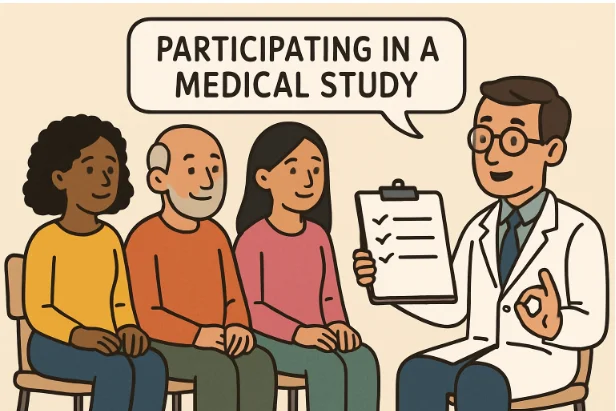Contents
- 1 Table of Contents
- 2 Introduction
- 3 What Is a Clinical Trial?
- 4 The Initial Steps: Screening and Eligibility
- 5 Understanding the Informed Consent Process
- 6 Your Trial Experience: What Daily Participation Looks Like
- 7 Risks, Benefits, and Support for Participants
- 8 Common Myths and Misconceptions
- 9 Questions to Ask Before Joining a Clinical Trial
- 10 The Last Step: After the Clinical Trial Ends
- 11 Conclusion: Making an Informed Choice
Table of Contents
- Introduction
- What Is a Clinical Trial?
- The Initial Steps: Screening and Eligibility
- Understanding the Informed Consent Process
- Your Trial Experience: What Daily Participation Looks Like
- Risks, Benefits, and Support for Participants
- Common Myths and Misconceptions
- Questions to Ask Before Joining a Clinical Trial
- The Last Step: After the Clinical Trial Ends
- Conclusion: Making an Informed Choice
Introduction
Considering participation in a clinical trial can raise numerous questions, from how trials work to what daily participation entails. Understanding the process is key to making informed decisions about your health and future. For a comprehensive overview, you may find answers about what will happen if I join clinical trial, as you begin to explore your options.
Participating in a clinical trial can be a rewarding and impactful experience, benefiting not only your own potential health but also advancing the progress of medical science. Whether you are motivated by the possibility of accessing new treatments or contributing to the development of future therapies, it’s essential to understand each step in the process and what to expect along the way.
What Is a Clinical Trial?
A clinical trial is a research study conducted with human participants to evaluate the safety and effectiveness of new medical treatments, drugs, devices, or interventions. These studies form the foundation of evidence-based medicine, enabling the development of innovative therapies and enhancing patient outcomes. There are several types of clinical trials, including interventional studies, where participants receive a specific treatment, and observational studies, in which researchers monitor health outcomes without assigning specific interventions.
Clinical trials play a vital role in medical research, allowing scientists and physicians to test hypotheses, gather data, and ensure that new medical approaches meet rigorous standards for safety and efficacy before they become widely available to the public.
The Initial Steps: Screening and Eligibility
Not everyone is eligible to join every clinical trial. The process begins by identifying potential participants based on factors such as age, medical history, current health status, and the specific requirements of the study. This is followed by an initial screening process, where doctors and research staff assess whether you meet the study’s eligibility criteria.
Screening may involve medical tests, such as blood work and physical exams, as well as detailed questionnaires about your health and lifestyle. Ensuring you are a good match for the trial is crucial to protect your safety and maintain the quality of research results. During this stage, researchers will clearly explain what the trial involves, and you’ll be given opportunities to ask any questions.
Understanding the Informed Consent Process
Informed consent is a cornerstone of ethical clinical research. Before you officially join a trial, you must review and sign a document called the informed consent form. This outlines the trial’s purpose, procedures, possible risks and benefits, your rights as a participant, and how your data will be handled.
It is vital that you feel comfortable asking about any aspects of the study that are unclear. Transparency is the priority during this stage, and no pressure should be placed on you to participate.
Your Trial Experience: What Daily Participation Looks Like
The day-to-day experience of participating in a clinical trial varies depending on the specific study. Most trials require some combination of regular appointments for treatment administration, health monitoring, and questionnaires about your symptoms or quality of life. You might be asked to keep a symptom diary or use electronic health tracking devices.
Clinical trials are typically divided into phases, each with distinct goals and varying levels of participant involvement. Early-phase trials (phases I and II) typically focus on determining the safety of treatments and optimal dosage levels. In contrast, later phases (phases III and IV) usually compare new treatment options to standard practices and monitor longer-term outcomes. To learn more about how these stages work, you can explore a detailed breakdown of the phases of clinical trials provided by the American Cancer Society.
Participating in a clinical trial can be both a commitment and an opportunity to play an active role in advancing medical knowledge. Each phase offers valuable insights that contribute to the development of safer and more effective treatments. By understanding the structure of these trials, participants can make more informed decisions about their involvement.
Risks, Benefits, and Support for Participants
Like any medical intervention, clinical trials come with potential risks and side effects. These are carefully explained during the consent process, along with the possible benefits, such as gaining access to promising new treatments or expert medical care. Involvement in a clinical trial can also have lasting value by advancing scientific knowledge and improving future care options for others.
Trials typically provide a range of support resources for participants, including frequent check-ins, clear contact channels for concerns, and sometimes access to counseling or patient advocacy groups.
Common Myths and Misconceptions
Misconceptions about clinical trials are common. Some people worry they’ll be treated as “guinea pigs” or won’t receive quality care. In reality, participant safety and well-being are top priorities, with strict oversight from ethics committees and regulatory authorities. Clinical research differs from routine medical treatment in that its primary goal is to answer scientific questions, yet the standards of care for participants are equally high.
Another myth is that trials are only for people who have exhausted other treatment options. In fact, clinical trials may be available for people at many stages of their medical journey. Comprehensive monitoring protocols are in place to promptly address any issues and ensure the protection of participants throughout.
Questions to Ask Before Joining a Clinical Trial
If you’re considering participating in a clinical trial, asking the right questions is crucial. Consider inquiring about the trial’s goals, procedures, potential risks and benefits, alternatives to participation, how your health will be monitored, and whether any costs will be covered.
Evaluating your willingness and ability to commit to the time, travel, and involvement required by the trial will help you determine if it suits your needs and lifestyle. Open and honest conversations with the research team are encouraged.
The Last Step: After the Clinical Trial Ends
Once your participation concludes, you may have follow-up visits with the research team to monitor your health and collect any final data. Participants often wonder when and how they’ll learn about the trial’s results. Generally, research results are published in medical journals and sometimes directly communicated to participants, depending on the trial’s policies.
Staying in touch with the research team after a trial ends can help you stay informed about study outcomes and contribute to ongoing advancements in science and medicine.
Conclusion: Making an Informed Choice
Deciding whether to participate in a clinical trial is a highly personal decision that requires careful consideration of the potential risks, benefits, and commitments associated with it. By understanding the process—from screening and informed consent to daily participation and follow-up—you can make a choice that aligns with your health goals and values. Clinical trials not only offer access to innovative treatments but also play a vital role in advancing medical knowledge that benefits future generations. Taking the time to ask questions and stay informed ensures that your participation, if chosen, is both meaningful and well-supported.




